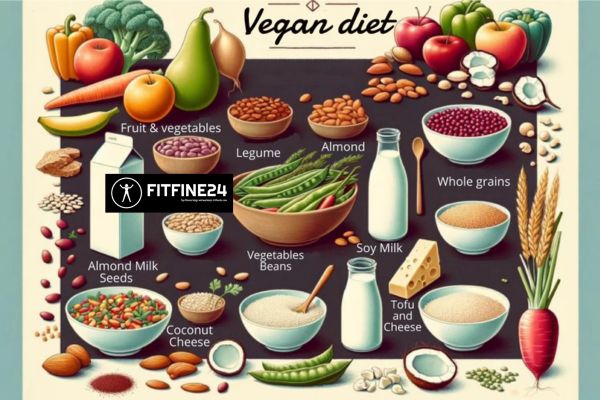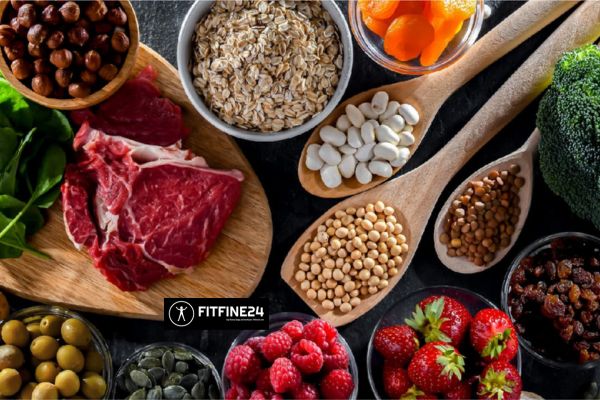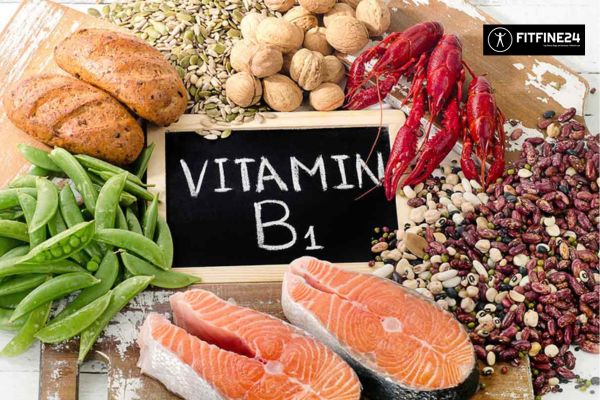Introduction
One of the more popular vitamins in recent times is Thiamin, or Vitamin B1, as you may know it. vitamin B1, We Need Razor Thiamin is a vitamin you must have to help change the food you eat into energy and help keep your nervous system working properly. In this article, we will go into things such as why Thiamin is trending and its benefits what are the best sources of thiamine or tips to fit yourself for daily intake.

What is vitamin B1 ?
Vitamin B1 is a member of the best b complex vitamins family of water-soluble vitamins. It controls both sides of the energy metabolism since it creates a huge influence on carbohydrate conversion into usable body power. The body does not store Thiamin; it needs to be consumed in the diet or supplements on a regular basis.
The Benefits ofvitamin B1 At fitfine24
Boosts Energy Levels
Vitamin B1 plays a major role in the conversion of carbohydrates into ATP (adenosine triphosphate), or, what could we say, cell currency energy. This is essential for anyone who wants to keep their energy up or have an active lifestyle in which they want to live, and even more so if you are an athlete.

Helps Maintain Optimal Nervous System
The role of thiamin in nerve function involves the production of neurotransmitters, chemicals that aid in transmitting signals within the brain. It keeps your nervous system feeling great, which can help to ward off problems such as memory disorders and irritability all the way up through neuropathy.
Aids in Digestion
vitamin B1 is an important part of the digestive process by aiding in the breakdown and use of food nutrients, ensuring your body effectively absorbs and uses energy. One of the great things about bone broth is that it helps break down proteins and fats in food. This can be especially helpful for anyone with a particularly delicate digestion, who may not absorb all those nutrients as well ordinarily.
Cardiovascular aid
Vitamin B1 is a nutrient that can protect the heart. Which makes sure the heart muscles have all of the energy that they need to work effectively. Vitamin B1 deficiencies have been implicated in the health of your cardiovascular system, adding vital importance to meeting daily needs for heart health.
Enhances Mental Focus
Thiaminis important for providing energy from the food you eat to cells and plays a role in brain function, which makes it an excellent choice to help increase focus and mental clarity. It supports cognitive functions, working as a memory enhancer, hence the best for career people, students, or regular lifestyles.

Top Sources of Thiamin
Vitamin B1 is available in a wide variety of nutrient-rich foods. Here are 6 healthy thiamine food resources.
Brown rice, whole wheat, oats, and barley: vitamin B1. Whole grains, for example, can top up your daily suggested intake of fiber.
Beans, lentils, and peas are high in vitamin B1, so it will be a good idea to include these legumes as another way of incorporating them into your diet. Throw them into any soup, salad, or entree for a little extra Thiamin in your diet.
Other great sources include sunflower seeds, flaxseeds, and macadamia nuts. These are perfect for snacks or as toppings in smoothies and on yogurt.
Animal Foods: Meats of wild chicken, liver, and eggs are good sources for one who eats non-vegetarian.
Fortified foods Many brands of cereal, breads, and pasta are fortified with Thiamin.
How Much Thiamin Do You Need?
The Estimated Average Requirement (EAR) for vitamin B1 is 1.0 mg/day, and the Recommended Dietary Allowance (RDA) also of thiamine in food and beverages tastes awful based on age±expressed as adult men tend to need about 1.2 mg per day, while adult women require around 1.1 mg daily (5). Pregnant / breastfeeding women may require slightly higher amounts Being water-soluble, thiamin is excreted by the kidneys if an excess occurs in the body, which lessens its chances of being toxic.
Do You Need a Thiamin Supplement?
The popularity of vitamin B1 tablets or multivitamins that contain B1 has grown along with the increasing use of health supplements at fitfine24. Supplements are a great way to get enough nutrients for those who have problems absorbing them or follow some kind of diet. Nonetheless, it’s still wise to consult with your united healthcare provider before including any supplement in your regimen.

So, in conclusion, Why Thiamin Deserves The Hype
That’s highly deserved in the case of vitamin water B1, as well as for its specific roles regarding nerve function and all aspects of energy efficiency. By adding thiamin-rich foods to your diet, it can help you to increase energy levels along with improving digestion and cognitive functions. Letting your Thiamin game stay on fleek (as the kids say) can be a bang-up way to keep energized and healthy, so it might as well become a thing.

